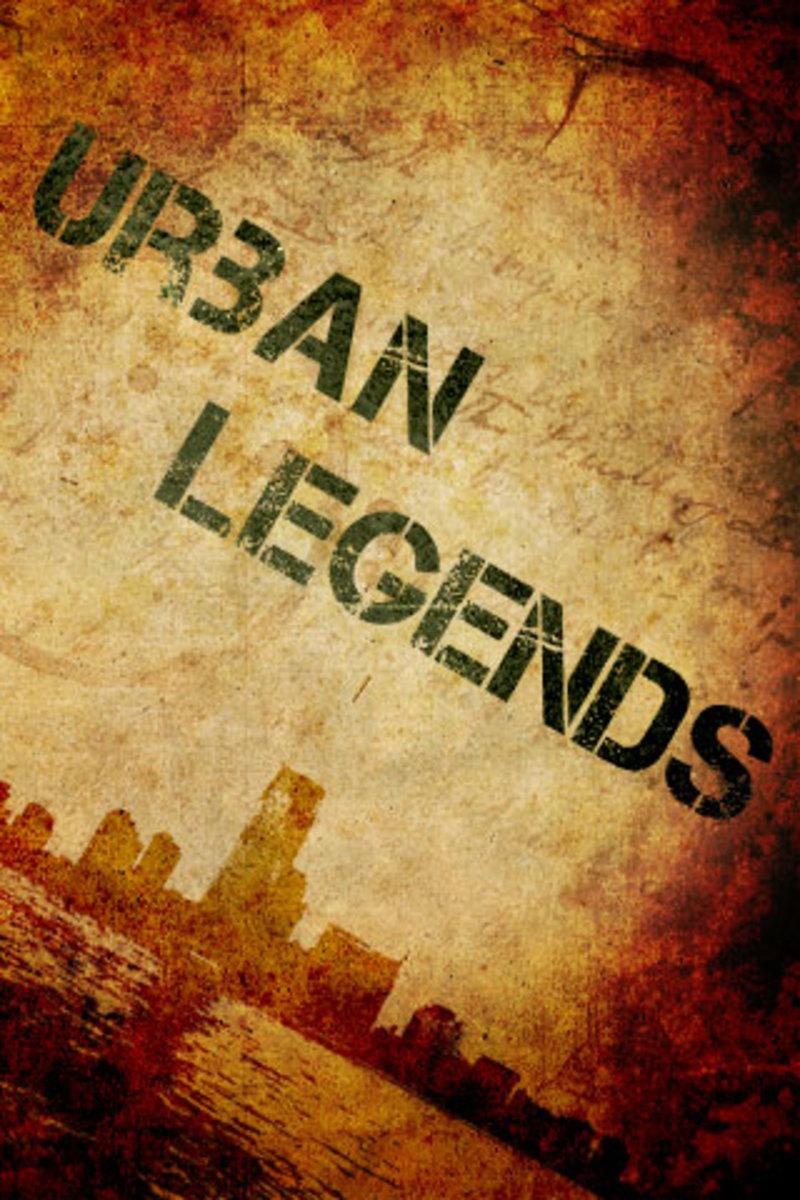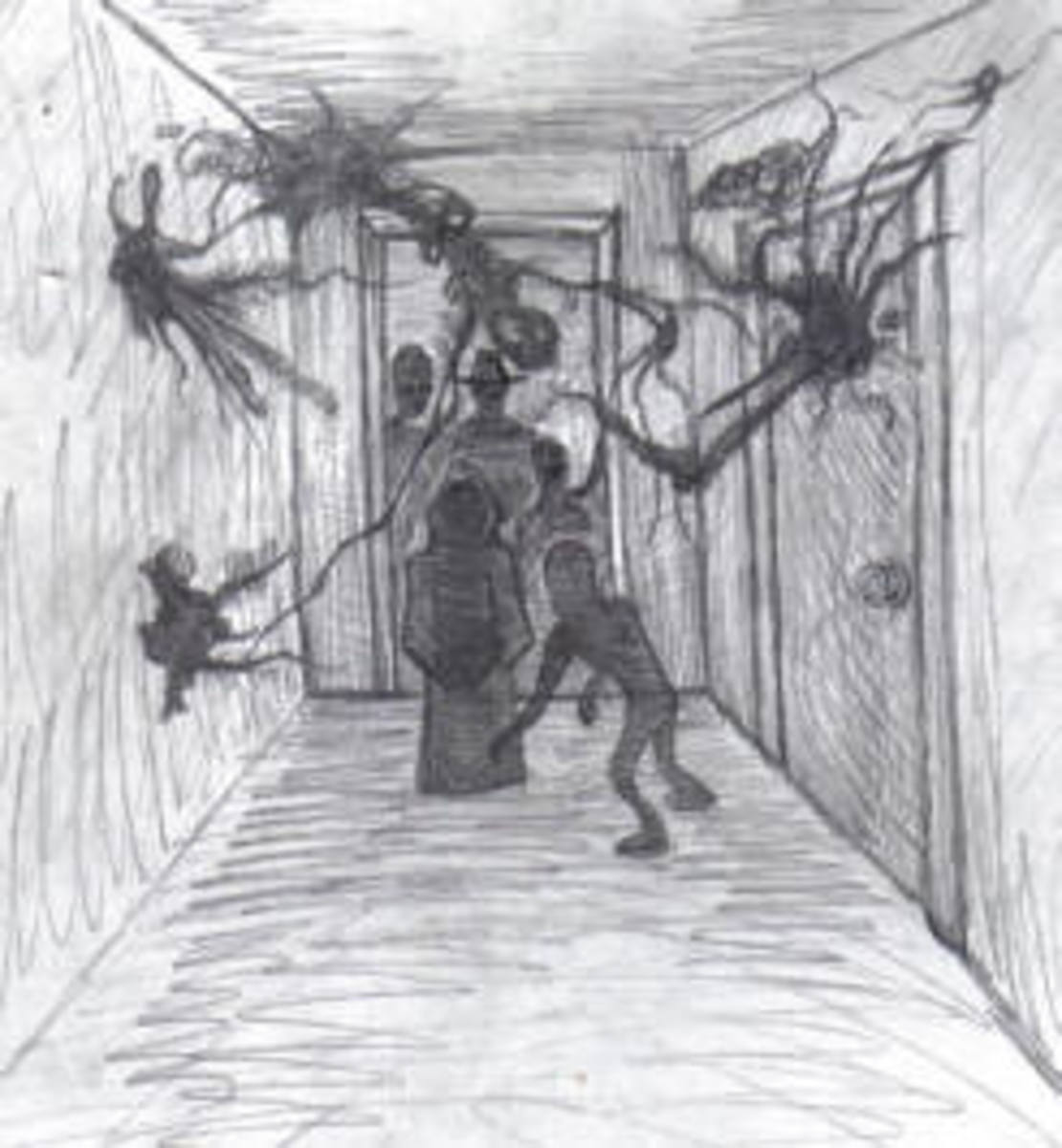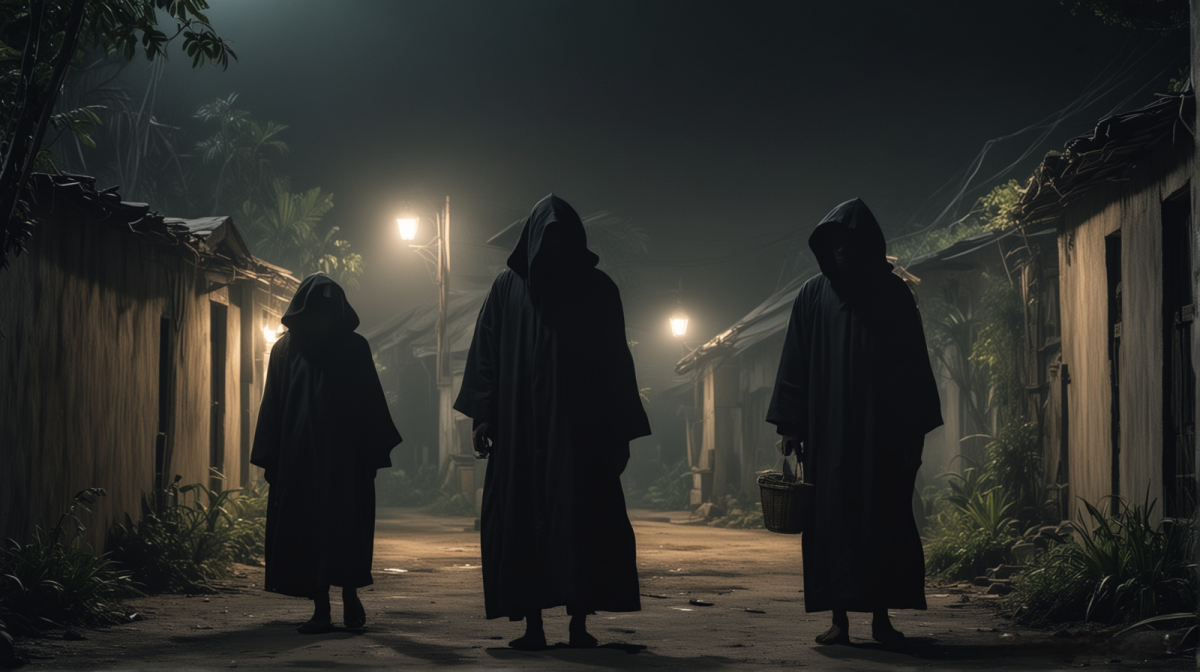How To Do Research On An Urban Legend
Hit The Books, Among Other Things

What Is Your Interest Level?
If you've ever considered researching into an urban legend but aren't quite sure how to go about it, this hub will give you some places to start.
First things first... you'll have to determine your interest level
Then... you'll have to figure out your level of knowledge thus far
Also... attempt to determine what sort of urban legend you're interested in
Determining your interest level:
- Are you just interested in learning more about a particular urban legend you've just heard? Sort of a "Gee, that legend is interesting. I wonder if it's true or where I can find out about it's validity..."
- Have you been reading/listening to urban legends and want to know a lot more about them? ie: they're often macabre - why is this so? (the function urban legends play in community and society)
- Are you GOOD AT TELLING urban legends and want to find more to discuss with friends, tell around a campfire or at parties? (for this, you probably want a "collection" to read, remember, rehearse, then start telling to your friends and other groups of people)
Current Level of Knowledge/Experience with Urban Legends:
- Have you just learned recently that there's a genre of storytelling, stories, and such called "urban legends"? But you're not quite sure how these differ from standard ghost stories, historical legends, fiction and other types of stories/genres?
- Are you somewhat of a fiction-buff and horror story fan and know several versions of particular tales? (actually, any genre, not just horror but ever so many urban legends relate to horror genres, so this is why "horror' was mentioned here).
- You basically know all the "Classic Urban Legends" but not what their deeper meanings are
- You basically know all the "Classic Urban Legends" and know, in general, what many of the deep meanings within the legends are (ie: "The Hook" primarily about parental fears about safety of teenagers, "Vanishing Hitch Hiker" warnings about travelling alone, among other meanings, etc)
- You already know a whole lot about urban legends, much about deeper meanings, how to tell an urban legend effectively, and you're looking to continue gaining knowledge to add to what you already know
What Sort Of Urban Legends:
Horror genre: Jigsaw Puzzle, The Hook, The Clown, Humans Lick Too
Paranormal genre: UFOlore, vanishing hitch hikers, ghost bridges, etc
Weird Events: Chief Cornstalk's Curse-SIlver Bridge-Mothman connections - Lore about Point Pleasant, West Virginia, USA. Or - "disasters" genre ie: Frank Mudslide (B.C. Canada)
Extreme Shock: Kidney Thieves, Exploding Cactus, "Finger Tales," etc
Interest and Types
My Interest Level
Least Time Consuming
If you're at a level of "just curious," then the least time consuming way to check out information on urban legends is to use popular online sources.
Sites like "snopes" "the museum of hoaxes," "truth or fiction," "scary for kids," and "about .com's paranormal and urban legends" sections are excellent places to browse around for urban legend material. Most of these sites also give some tips and explanations on urban legend meaning, validated origins of SOME urban legends, etc. Most of the sites mentioned will probably not give you an extensive education on urban legends but only because studying urban legends can be as shallow a process and experience or as in-depth as you choose.
(my personal favourites are snopes, about .com and scary for kids sites)
For most people, the about .com website will have ample information to allow a person to become at least an "amateur" and capable storyteller where urban legends are concerned - as well as understand the "impact" telling an urban legend can have upon an audience.
* Note: browsing for urban legends at these sites can be least time consuming - UNLESS - you find you become more and more interested in the topics and spend too much time browsing. Please take breaks (some of these stories will literally "GRIP" you and if you really like them, you'll have trouble getting away from them as your mind becomes stimulated) so that you don't spook yourself too much or strain your eyes from reading too much.
Also - it is a good idea to research multiple sources. No doubt, you're going to find multiple "VERSIONS" of most urban legends you search for. One thing to remember when doing all of this is: the urban legends are "versions" and they all mean something and tell something about the complexities of societal fears, taboos, etc., so there aren't "right" and "wrong" versions and there aren't "more valid" versions between versions... Some versions might incorporate some traceable "historical" details. This doesn't make said version "true" and other versions "false." You'll have to just take these details for what they are... a version with historical details versus another version with some details that aren't verifiable in history books. For the latter...the version is definitely still a valid version because it circulates. Someone - or many people - still felt it was important to tell this version or else it wouldn't continue to circulate.
Urban Legends aren't necessarily about historical truths. This is why I never "debunk" urban legends in the way that most people think of "debunking" (as something like "exposing a hoax"). I usually just end up with a statement like, "this urban legend has been traced to "this or that location" or "this or that storyteller" " or else I can say, "the events in this urban legend are not yet verifiable by any authorities." Much nicer and truer statements than "this story is bunk" or "this story is debunked as a lie."
More Time Consuming
Now if you find your interest level increasing, you can spend more time learning about urban legends by going to your local library or a good online library (will provide links below).
There are a lot of books in libraries that explain hoardes of information about urban legends. There are tons of "collections" in book, too, so you can either select "depth" of information (info books) or "quantity" (collections of stories) where urban legends are concerned.
You can also - obviously, if you have the cash available for this - go to book stores to find books about urban legends.
Tips for Librariy Searches and Book Store Searches:
- look in "folklore" sections
- look in paranormal sections
- new age sections
- spirituality sections
- ask the librarian or book shop owner/staff to suggest books or sections of the library/store to browse in
* (a fave of mine) ask the librarian/book store owner/staff if they know of any local history related to urban legends, any ghost story collections about the local region, etc. This will likely gain you a librarian or book owner/staff who will remember you for the next time you come in, as well as strike up what should be a very interesting discussion... most librarians and book store owners/staff turn out to be at least amateur historians and LOVE local lore... (in my experience, I have not yet found a librarian or book loving book store owner/staff who hasn't known quite a bit about local legends or who will not GET SUDDENLY INTERESTED in them and start actively helping you with your research!).
Resource Links:
- The Free Library
- The Online Books Page
- eBooks Read
- Project Gutenberg AND Many Books .net (my top choices!)
- Amazing Facts Online Library
- Timeless Truths Online Library
(if you know of a free online resource please let me know and I will list it here)
Can Be Very Time Consuming But Very Rewarding
Take a course on "storytelling," "urban legends" "legends" "historical theme related to myth/legend" "fairy tales" "folklore and fairies" "horror genre tales" or anything related and learn what your instructor can teach about researching, enjoying, learning in these areas.
Join a "storytelling/storyteller" group or community. If there's not one in your geographical area, there are online virtual groups for you to join, participate in and learn from.
Back To The Library:
get specific and personal one-on-one help from a librarian regarding researching old documents - how to use microfiche machines or other equipment in the library
get one-on-one help from a librarian - book a time for "learning" and learn some basic research methodology or research tidbits from your librarian
get into the library's archives and find out about old events, links to newspaper stories related to local legends
set a "schedule" of study for yourself... start with a classic urban legend, keep a notebook on all the information you can find in one library related to one urban legend
Classic Urban Legend - One Project:
- If you select "The Hook" as the legend you'll study, check collections and read 5-10 versions of this legend. Write down the variations in details in your notepad
- Find any local news stories from the past 20 years which were from Hallowe'en season and find out if anyone offered "The Hook" story in a special section of the newspaper at any time... if so, compare versions to the ones already in your notes
- Pick out the themes in all the versions of The Hook you've read, thus far
- After finding themes, look in some historical texts to see if there is any connection with societal taboos in certain time periods as connected with the taboos in "The Hook."
You can literally take "The Hook" through any major section in the library, in a multidisciplinary way. If you get really good at locating books and picking out themes (you probably are if you have gotten to this point already), you'll notice that urban legends can have implications in many major fields... sociology, history, psychology, literature/English studies (specific other-language studies, too), philosophy, etc. You'll find that sociologists, historians, psychologists, literary critics and many more professionals are interested in urban legends, their origins, their impact upon society, their memes, cathartic values in some urban legends, etc.
Rewards:
In depth, multidisciplinary research will not only provide details you were wondering about concerning urban legends (and probably some details you didn't expect to find), but also about the world, in general... people who tell the stories, people who listen - WHY these urban legends circulate, why they change, who changes them, collections of versions and why different versions appear at different times...
You'll understand how some forms of "communication" work covertly in our society... ie: stories about technology (The Beast - Supercomputer) relate to our current fears that technology will overtake us, overwhelm us someday (isn't it, in some cases, already?).
Why These Things Are Important:
- urban legends essentially tell us about US....the things we fear, love, hate, the tendencies we have toward life, ourselves, the planet and each other.
ie: many of us will tell "The Hook" just for entertainment - but many of us will tell "The Hook" to teenagers at least wondering (or hoping) that this urban legend scares them into staying close to home when dating... there are a ton of other reasons this legend is told, but two primary reasons are already stated here.
Research Example, Frustrations Included for FREE! :)
Pick an urban legend for researching. For my example, I will use the Springheeled Jack legend...
Springheeled or Springheel Jack caused terror in England by his antics which have some backing of newspaper documentation from the 1800's, so this is a really interesting legend to work with (personally, I'm still working "with"/researching on this legend). Springheel Jack showed up around the 1830's, had incredible physical agility and was seen many times by a number of people, even a group of military men guarding at Aldershot Barracks. This entity, Springheel Jack would suddenly appear, leaping great heights and distances, and he scared people because he didn't move like the average person, was able to leap over 8-19 foot walls/fences, and he was aggressive, even slapping or scratching people, according to eyewitness accounts. He was strangely outfitted for the times, as well, and - in general - nobody has ever figured out Springheel Jack's purpose for showing up, where he came from or even WHAT kind of being he was...some say we don't know yet, either, if Springheel Jack actually, truly, went away.
Identify the urban legend for researching: Springheel Jack
Check out what Snopes has to say: Snopes.com Website Link
hint - snopes hasn't focused on this urban legend yet
If you come to a "dead end" don't worry...check out the next popular online resource
Check out what The Museum of Hoaxes: Museum of Hoaxes Archive Page
If you come to a "dead end" - again, don't worry - check out the next resource (I personally only found information about "jack" in forum threads at the Museum of Hoaxes site)
Check out what Truth or Fiction has to say: Truth or Fiction Mainpage
Whaaaaaat???? Still no information?
Hey - get used to that. It will happen often. (trying to show you how to get AROUND the issue of a legend not being "popular" enough on this current date - to be on the popular sites. Don't worry - there's a LOT of information out there - just not at the most popular sites)
Next, check out About .com and see what this site has: About .com Main
Voila (use the search feature and just type "springheel jack" "springheeled jack" or * "spring heeled jack")
BINGO!!! See: mention of Springheel Jack on this page
Unfortunately, this page is a "new byte" page with just a summary of topics, so you'll have to go to the following page and check it out (still, something is turning up here finally - yay):
http://paranormal.about.com/od/paranormalgeneralinfo/a/news_100220n.htm
The link above is where the last topic link led to...
Now... nothing.
Darnit - Springheel Jack Got Away Again!!!!!! (this happens often with researching urban legends)
Just kidding - actually - you WILL MISS THE ARTICLE if you are too hasty! Make sure to become familiar with about .com's navigation - there's simply a "next" arrow to use and the Springheel Jack article, "Spring-heeled Jack and the terrified child" is on page 2 of the search/topic results.
Article linking away from about .com site: Spring-heeled Jack and the terrified child
Voila, Bingo and all that...
Now you've ended up on a blog from no less than a FORTEAN site (forteana .org) - AWESOME - you are definitely in the right place now to learn about Springheel Jack! The article is written by Mike Dash, a best-selling author and historian. (Mike Dash often takes a look at "common versions" of historical events and researches them to find out if what we've been told is "how things really happened." When he finds discrepancies, he writes about these - waaaaaay cool, dude!)
A little side research - check out:
- "Charles Fort" "Forteans" and "Forteana" to find out if your source (forteana .org) is one you'll want to stick with for a bit (it should be, in this case).
- Mike Dash - check up on this guy - he's pretty well-respected
If you didn't find what I found from your searches or if, after that, you hit a dead end...
Time to go to the old "standby" - The "Big G"
Just do a Google search!!!
I generally do not tell people to do a google search right off the start because - as you can tell from the example I've led you through - you're likely to hit upon a reasonable source (Mike Dash vs a popular blogger who might be #1 on google with intricate keyword placement? Who do you want to listen to first?) with authority if you use the actual sites first vs using google and search broadly from the start.
Find or Host a Story Circle
This option can be time consuming but very fun. It can be as elaborate or simple as you want to make it, depending on whether you host a storytelling circle/event or find one that someone else has arranged.
If you want to get super-organized, you can hire a friend/ask a friend to volunteer to do something like "meeting minutes" or notes around the whole storytelling circle event that you plan in your own home/yard, nearby campground or park. Of course, you'll have to ask permission from the storytellers - and if this request becomes a bit complicated, simply tell people ahead of time that the story circle is for the telling of urban legends... nobody "owns" most of the urban legends.
Example: invite friends who like to tell or listen to stories. Ask them to show up, each with 3 urban legends in mind for telling in the story circle. The nice thing is that when people show up with the same legends in mind, it's NOT GOING TO MATTER that they tell the same stories because they'll likely tell different VERSIONS of urban legends.
You can certainly take notes or have someone help you take notes and then attribute each storytelling time to whoever is telling the story ie: "Exploding Cactus as told by friend, Kevin" or "The Licked Hand as told by Susie."





